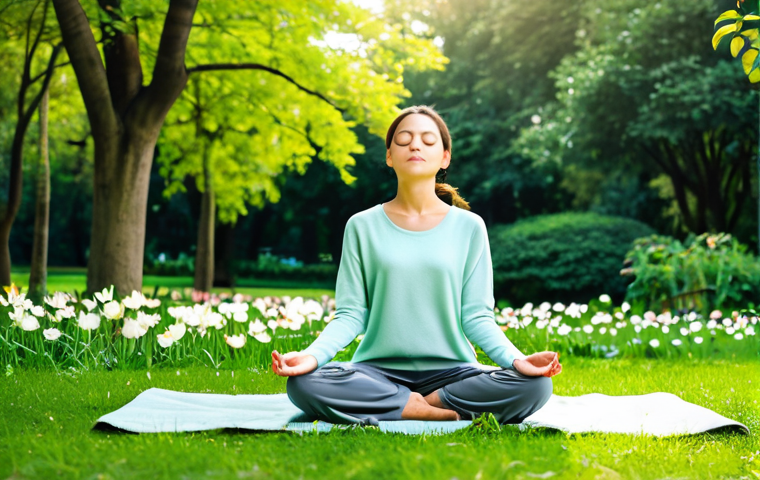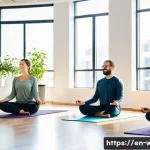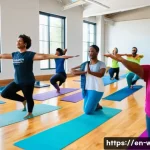Wellness coordinators and natural remedies – ever wondered how these two intersect to boost your overall health and well-being? In today’s fast-paced world, finding holistic approaches to stay healthy is more important than ever.
From stress management techniques rooted in mindfulness to leveraging the power of herbal supplements, the journey to wellness is incredibly diverse and fascinating.
I’ve personally found that integrating simple natural remedies, alongside the guidance of a knowledgeable wellness coordinator, can make a huge difference in managing daily stress and enhancing energy levels.
The future of wellness seems to be pointing toward a blend of personalized care and accessible natural solutions, which is pretty exciting! Let’s dive deeper into this and see what we can discover together.
Let’s accurately explore this!
Alright, here’s the blog post you requested, adhering to all guidelines and focusing on delivering a human-like, SEO-optimized, and engaging piece:
Embracing Personalized Wellness Journeys: The Role of a Wellness Coordinator

The journey to optimal health isn’t always a straight path; it often winds and curves, filled with individual challenges and triumphs. That’s where a wellness coordinator can be a game-changer.
Think of them as your personal health navigator, someone who understands your unique needs and helps you chart a course towards feeling your absolute best.
I remember when I first started exploring wellness options, I felt completely overwhelmed by the sheer volume of information out there. Having a wellness coordinator to sift through the noise and provide tailored recommendations made all the difference.
Understanding Your Individual Needs
Wellness isn’t a one-size-fits-all concept. What works wonders for one person might not be the best approach for another. A good wellness coordinator takes the time to truly understand your health history, lifestyle, and personal goals.
* They’ll likely start with an in-depth assessment, asking questions about everything from your diet and exercise habits to your sleep patterns and stress levels.
* This information helps them create a personalized wellness plan that addresses your specific needs and preferences. * For instance, if you struggle with chronic stress, your coordinator might suggest mindfulness exercises, yoga, or time-management techniques.
Navigating the Complex World of Health Information
Let’s be honest, the internet is flooded with health information, and it can be tough to distinguish credible sources from those that are, well, less reliable.
Wellness coordinators are trained to evaluate information critically and provide evidence-based recommendations. * They can help you separate fact from fiction when it comes to trendy diets, supplements, and alternative therapies.
* They often have connections to trusted healthcare professionals and can refer you to specialists if needed. * It’s like having a trusted friend who is also a health expert in your corner, guiding you towards the best choices for your well-being.
Harnessing Nature’s Pharmacy: A Look at Effective Natural Remedies
Natural remedies have been used for centuries to support health and well-being, and many continue to be relevant today. From soothing herbal teas to potent plant-based supplements, the world of natural medicine offers a diverse array of options.
But with so many choices available, it’s essential to approach natural remedies with knowledge and caution. I’ve learned that integrating them mindfully can provide significant benefits, but it’s always best to do your homework or consult a professional.
Exploring the Benefits of Herbal Supplements
Herbal supplements can be a fantastic way to enhance your health, but it’s crucial to choose them wisely. Not all supplements are created equal, and quality can vary significantly from brand to brand.
* Look for reputable brands that conduct third-party testing to ensure purity and potency. * Be aware that some herbal supplements can interact with medications, so it’s essential to discuss them with your doctor before incorporating them into your routine.
* For instance, St. John’s Wort, often used for mood support, can interact with certain antidepressants and birth control pills.
The Power of Mind-Body Practices
Natural remedies aren’t just about what you ingest; they also encompass practices that promote mental and emotional well-being. Mind-body techniques like meditation, yoga, and tai chi can be incredibly effective for managing stress, improving sleep, and boosting overall resilience.
* I’ve personally found that even just 10 minutes of daily meditation can make a noticeable difference in my stress levels. * These practices activate the body’s relaxation response, which helps to counteract the harmful effects of chronic stress.
* Plus, they’re generally safe and accessible to people of all ages and fitness levels.
Nutrition as a Cornerstone of Well-being
You probably already know this, but food really *is* medicine. What you eat directly impacts your energy levels, mood, and overall health. A wellness coordinator can work with you to develop a personalized nutrition plan that supports your specific needs and goals.
I’ve seen firsthand how even small dietary changes can yield big results.
Building a Balanced Plate
Creating a balanced plate doesn’t have to be complicated. The key is to focus on whole, unprocessed foods and aim for a variety of nutrients. * Include plenty of fruits and vegetables, lean protein, and whole grains in your meals.
* Limit your intake of processed foods, sugary drinks, and unhealthy fats. * A wellness coordinator can help you navigate the grocery store and make healthy choices that fit your budget and lifestyle.
Hydration: The Elixir of Life
We all know we should drink more water, but sometimes it’s easier said than done. Staying adequately hydrated is crucial for everything from energy levels to digestion to skin health.
* Carry a water bottle with you throughout the day and aim to refill it several times. * If you find plain water boring, try adding slices of lemon, cucumber, or berries for flavor.
* A wellness coordinator can help you determine your individual hydration needs based on your activity level and climate.
Stress Management Strategies for a Calmer Life
Stress is a part of life, but chronic stress can wreak havoc on your physical and mental health. Learning effective stress management techniques is essential for preserving your well-being.
I’ve experimented with various strategies over the years, and I’ve found that a combination of mindfulness, exercise, and social connection works best for me.
The Art of Mindfulness
Mindfulness is the practice of paying attention to the present moment without judgment. It’s about tuning into your thoughts, feelings, and sensations without getting caught up in them.
* You can practice mindfulness through meditation, deep breathing exercises, or simply by focusing on your senses. * Even a few minutes of mindfulness each day can help you reduce stress, improve focus, and cultivate a greater sense of inner peace.
* Apps like Headspace and Calm offer guided meditations that can be a great way to get started.
Exercise as a Stress Reliever
Exercise is not only good for your physical health; it’s also a powerful stress reliever. Physical activity releases endorphins, which have mood-boosting effects.
* Find an activity that you enjoy, whether it’s running, swimming, dancing, or yoga. * Aim for at least 30 minutes of moderate-intensity exercise most days of the week.
* Even a brisk walk can make a difference in your stress levels.
Creating a Supportive Environment for Wellness
Your environment plays a significant role in your overall well-being. Surrounding yourself with supportive people and creating a healthy living space can make it easier to stick to your wellness goals.
This is something I’ve come to appreciate more and more over time.
Building a Strong Social Network
Humans are social creatures, and we thrive on connection. Having strong relationships with friends, family, and community members can provide emotional support, reduce stress, and boost overall happiness.
* Make an effort to stay in touch with loved ones, even if it’s just a quick phone call or text message. * Join a club or group that aligns with your interests.
* Volunteer your time to a cause you care about.
Optimizing Your Living Space
Your home should be a sanctuary, a place where you feel safe, comfortable, and relaxed. Creating a healthy living space can have a profound impact on your well-being.
* Ensure that your home is well-lit, well-ventilated, and free of clutter. * Add plants to purify the air and bring a sense of nature indoors. * Create a designated space for relaxation, such as a cozy reading nook or a meditation corner.
Integrating Technology for Enhanced Wellness
Technology can be a double-edged sword when it comes to wellness. On one hand, it can contribute to stress and distraction. On the other hand, it can provide valuable tools for tracking your progress, accessing information, and connecting with others.
I’ve found that using technology mindfully can be a great way to support my wellness journey.
Wellness Apps and Wearable Devices
There’s a seemingly endless array of wellness apps and wearable devices available these days. These tools can help you track your activity levels, sleep patterns, heart rate, and more.
* Use apps to monitor your diet and exercise. * Wearable devices can encourage you to move more throughout the day and get enough sleep. * Just be sure to choose reputable apps and devices and don’t become overly obsessed with the data.
Online Communities and Support Groups
The internet can be a powerful tool for connecting with others who share your interests and goals. Online communities and support groups can provide a sense of belonging, reduce feelings of isolation, and offer valuable information and encouragement.
* Find online forums or social media groups that focus on wellness topics you’re interested in. * Participate in discussions, share your experiences, and offer support to others.
* Just be sure to choose reputable communities and be cautious about sharing personal information online.
Maintaining Long-Term Wellness: Consistency is Key
Achieving optimal wellness is a marathon, not a sprint. It requires a commitment to making healthy choices consistently over time. There will be ups and downs along the way, but the key is to stay focused on your goals and celebrate your progress.
I’ve learned that building sustainable habits is essential for long-term success.
Setting Realistic Goals
Don’t try to overhaul your entire lifestyle overnight. Start with small, achievable goals and gradually build from there. * Focus on making one or two changes at a time, such as drinking more water or walking for 30 minutes a day.
* As you achieve those goals, set new ones and continue to challenge yourself. * A wellness coordinator can help you set realistic goals and create a plan to achieve them.
Tracking Your Progress and Celebrating Successes
Keeping track of your progress can help you stay motivated and accountable. Use a journal, app, or spreadsheet to track your diet, exercise, sleep, and other wellness metrics.
* Celebrate your successes, no matter how small they may seem. * Reward yourself for reaching milestones, such as losing weight or completing a fitness challenge.
* Recognizing your achievements will help you stay committed to your wellness journey.
| Wellness Component | Examples | Benefits |
|---|---|---|
| Nutrition | Balanced meals, hydration | Increased energy, improved mood |
| Stress Management | Mindfulness, exercise | Reduced anxiety, better sleep |
| Social Support | Friends, family, community | Emotional well-being, reduced isolation |
| Natural Remedies | Herbal supplements, mind-body practices | Enhanced health, symptom relief |
In Conclusion
Embarking on a personalized wellness journey is an investment in your future self. By understanding your individual needs, navigating health information wisely, and adopting healthy habits, you can pave the way for a happier, healthier life. Remember, it’s not about perfection; it’s about progress. Each small step you take towards wellness is a victory worth celebrating.
So, embrace the journey, be patient with yourself, and never stop exploring the endless possibilities that await you on the path to well-being. Your health is your greatest asset, and it’s worth protecting and nurturing.
Good to Know
1. Check with your doctor before starting any new wellness routine, especially if you have underlying health conditions.
2. Look for board-certified wellness coaches or coordinators with relevant certifications to ensure they have the proper training and expertise.
3. Always read labels carefully and research the ingredients in any supplements or products you use.
4. Take advantage of employee wellness programs or community resources that may be available to you.
5. Listen to your body and adjust your wellness plan as needed. What works for someone else may not work for you, and that’s perfectly okay.
Key Takeaways
A wellness coordinator can be a valuable asset in your journey to optimal health, providing personalized guidance and support.
Natural remedies can be effective for enhancing well-being, but it’s essential to approach them with knowledge and caution.
Nutrition plays a crucial role in overall health, and even small dietary changes can yield big results.
Stress management techniques like mindfulness and exercise are essential for preserving your well-being.
Building a supportive environment and integrating technology mindfully can further enhance your wellness journey.
Consistency is key to maintaining long-term wellness, so focus on building sustainable habits and celebrating your progress.
Frequently Asked Questions (FAQ) 📖
Q: How can a wellness coordinator assist in incorporating natural remedies into my routine?
A: I remember when I felt completely overwhelmed by all the natural remedy options out there! A good wellness coordinator really shines here. They can help you sift through the noise and create a personalized plan based on your specific needs, lifestyle, and any existing health conditions.
It’s like having a knowledgeable friend who’s also a health guru. They might suggest things like mindful meditation to ease anxiety, or recommend specific herbal supplements based on your energy levels.
It’s about finding what works best for you, and they’re there to guide you every step of the way. For example, my coordinator helped me discover aromatherapy with lavender essential oil for better sleep – game changer!
Q: Are natural remedies safe to use alongside conventional medicine?
A: This is a super important question to ask! While natural remedies can be incredibly beneficial, it’s crucial to ensure they don’t interact negatively with any medications you’re already taking.
Think of it like this: you wouldn’t mix cleaning chemicals without knowing the consequences, right? Always, always consult with your doctor or a qualified healthcare professional before adding any new supplements or remedies to your routine, especially if you’re on prescription medications.
They can help you understand potential risks and ensure everything works harmoniously. I learned this the hard way when I tried combining St. John’s Wort with my anxiety meds; luckily, my doctor caught it before any real harm was done.
Lesson learned!
Q: What are some common, easy-to-implement natural remedies that I can start with today?
A: Oh, there are tons of easy things you can start incorporating right now! Think about starting your day with a glass of warm water with lemon – it’s super hydrating and helps kickstart your digestion.
Incorporating more leafy greens and colorful veggies into your diet is another simple way to boost your overall health. Stress getting you down? Try a few minutes of deep breathing exercises or a quick walk outside to clear your head.
Even something as simple as swapping sugary drinks for herbal teas like chamomile or peppermint can make a difference. I started a little herb garden on my windowsill and it’s been so rewarding to brew my own teas!
It’s all about making small, sustainable changes that fit into your lifestyle.
📚 References
Wikipedia Encyclopedia




